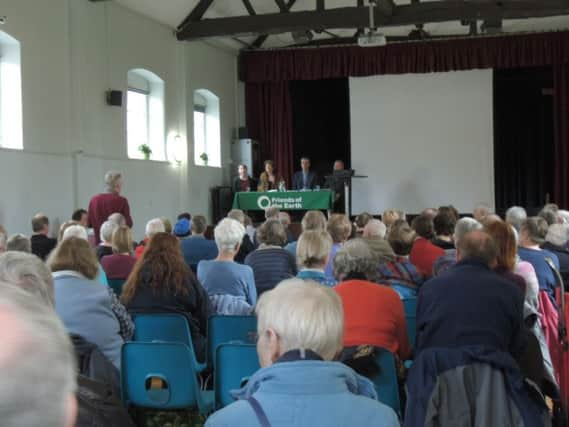'˜Impressive' interest in Leighton on saving the planet


About 100 people gathered at Leighton Middle School on Saturday, November 26 for the “How to power the UK and save the planet” meeting chaired by Andrew Selous MP.
The key expert speaker was Neil Witney, a Senior Policy Adviser to the government Department of Business, Energy and Industrial Strategy, who lives in Leighton Buzzard.
Advertisement
Hide AdAdvertisement
Hide AdThis was followed by an update from Esther Clarke on the Low Carbon Leighton Linslade initiative.
Mr Selous said: “This was a very well attended meeting with a highly knowledgeable senior official speaking.
“I was very impressed with the strong interest locally in Leighton Buzzard and Linslade playing their part in securing clean, reliable and affordable energy for the future”.
Ms Clarke, of Leighton Linslade Christian Ecology, said: “Another well attended and lively meeting showing again the strength of support at the grass roots for everyone coming together to battle climate change at local, regional and national levels. The Low Carbon Leighton Linslade initiative is really beginning to take shape with a number of existing groups adding support and new groups forming to tackle specific issues.”
Advertisement
Hide AdAdvertisement
Hide AdMr Witney set the context by explaining that 2015 had shattered the record for warmest year globally by largest margin yet and that in 2016 another record low for Artic sea ice had been reached.
He explained the government commitment to balancing security of supply, the cost of electricity and cutting carbon emissions. The UK has commitments under its own climate law to cut emissions by 80% by 2050 in order to meet the international Paris agreement on climate change.
He highlighted the good news that there has been a steady decline in emissions from electricity production, industry and waste, but transport agriculture and buildings are flatlining.
The key change in electricity production has been the replacement of coal by gas together with an big increase in renewables with the first tidal power plant having just come online in Scotland.
Advertisement
Hide AdAdvertisement
Hide AdNeil gave a sense of the costs of different renewables. Using the figures for a Megawatt hour of electricity in 2020, tidal and wave came out approximately at about £300 whereas in comparision offshore wind is about £90 to £120, solar farms are £60-£80 large scale onshore wind is about £ 50- £75.
He explained that by 2050 all electricity has to be generated from a mixture of different renewables and some nuclear and that the next big challenge for the UK is heating which causes a third of UK emissions and also is responsible for half of people’s energy bills. He said progress on energy efficiency of buildings has really stalled.
He urged people to take action locally on improving local buildings and particularly taking part in on the consultation on Central Bedfordshire’s Development Strategy which will take place in March.
The MP and councillors joined in with stressing the importance of local involvement in this plan in order to get more renewables and higher building standards locally.
Advertisement
Hide AdAdvertisement
Hide AdMs Clarke then explained that Low Carbon Leighton Linslade covers the five key areas of energy, transport, food, waste and recycling and biodiversity.
Community Energy Leighton Linslade has had its first meeting. Buzz Cycles which played a big role in making the town a cycling town is now lobbying for more much-needed investment to support cycling and is also pushing for the implementation of the “Green Wheel” which is the wheel of greenspace and footpaths surrounding Leighton Buzzard.
Victoria Harvey from South Bedfordshire Friends of the earth explained plans to set up a transport campaign to improve buses, South Beds Friends of the Earth’s campaign to proactively support the Farmers Market in order to promote local food, their big campaign for more local large scale renewable energy which is to support the application for a second wind turbine at Heath and Reach, and on biodiversity the 17 bee-friendly habitats that have been created around the town.
Then followed a range of practical and highly technical questions covering concerns over building standards in new houses, the benefits of solar, concerns over bus transport and demands for Renewables beside the new link road to the M1.
The meeting was jointly organised by South Bedfordshire Friends of the Earth and Leighton Linslade Christian Ecology Group as part of the Low Carbon Leighton Linslade Initiative.